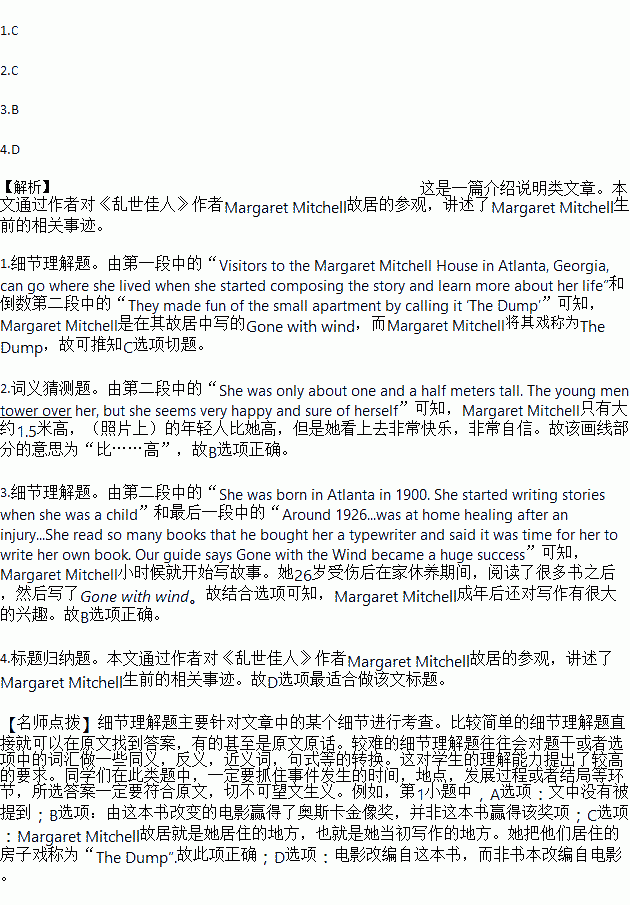题目内容
The writer Margaret Mitchell is best known for writing Gone with the Wind, first published in 1936. Her book and the movie based on it, tell a story of love and survival during the American Civil War. Visitors to the Margaret Mitchell House in Atlanta, Georgia, can go where she lived when she started composing the story and learn more about her life.
Our first stop at the Margaret Mitchell House is an exhibit area telling about the writer’s life. She was born in Atlanta in 1900. She started writing stories when she was a child. She started working as a reporter for the Atlanta Journal newspaper in 1922. One photograph of Ms. Mitchell, called Peggy, shows her talking to a group of young college boys. She was only about one and a half meters tall. The young men tower over her, but she seems very happy and sure of herself. The tour guide explains: “Now in this picture Peggy is interviewing some boys from Georgia Tech, asking them such questions as ‘Would you really marry a woman who works?’ And today it’d be ‘Would you marry one who doesn’t?’ ”
The Margaret Mitchell House is a building that once contained several apartments. Now we enter the first floor apartment where Ms. Mitchell lived with her husband, John Marsh. They made fun of the small apartment by calling it “The Dump ” .
Around 1926, Margaret Mitchell had stopped working as a reporter and was at home healing after an injury. Her husband brought her books to read from the library. She read so many books that he bought her a typewriter and said it was time for her to write her own book. Our guide says Gone with the Wind became a huge success. Margaret Mitchell received the Pulitzer Prize for the book. In 1939 the film version was released. It won ten Academy Awards, including Best Picture.
1.The book Gone with the Wind was _________.
A. first published on a newspaper B. awarded ten Academy Awards
C. written in “The Dump” D. adapted from a movie
2.The underlined phrase “tower over” in Paragraph 2 is closest in meaning to_________.
A. be very pleased with B. show great respect for
C. be much taller than D. show little interest in
3.Why did Ms. Mitchell stop working as a reporter according to the passage?
A. Because she was rich enough. B. Because she was injured then.
C. Because her husband didn’t like it. D. Because she wanted to write books.
4.Which is the best title for the passage?
A. Gone with the Wind: A Huge Success.
B. Margaret Mitchell: A Great Female Writer.
C. An Introduction of the Margaret Mitchell House.
D. A Trip to Know Margaret Mitchell.

